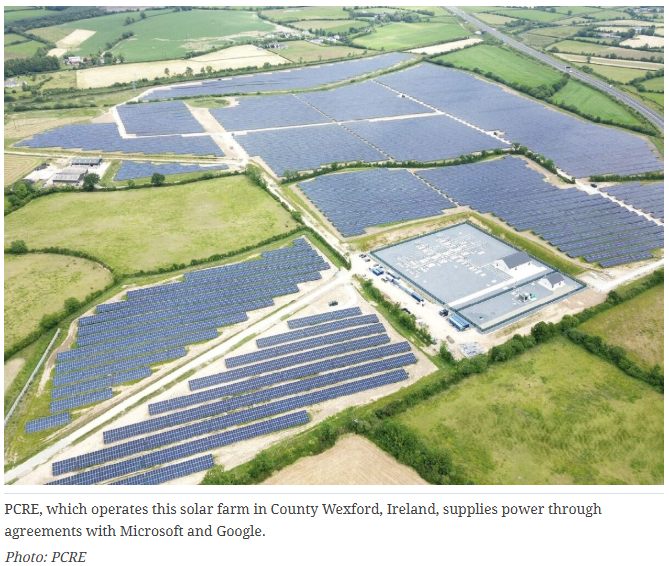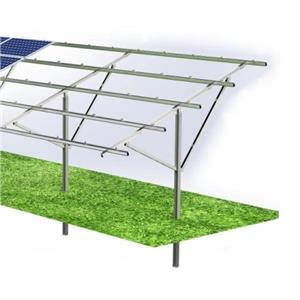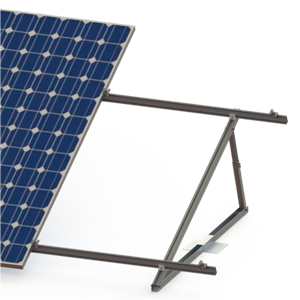Pioneers in Irish solar energy
From modest beginnings in 2011, Power Capital Renewable Energy (PCRE) has become one of Ireland’s foremost independent power producers (IPPs). Joint CEO and co-founder Justin Brown told pv magazine that despite Ireland’s challenging environment for solar, the company sees a lot of opportunity and is taking full advantage.
January 18, 2025 Blathnaid O'Dea
From pv magazine 12/24-01/25

Back in the early 2000s, when solar was first taking off in Europe, Irishman Justin Brown and his business partners began investing in small-scale facilities in Germany. Brown said they took a few years there to learn all facets of the market and how solar might benefit Ireland in time to come.
By the time solar eventually made its way into the national renewable energy transition conversation, Brown and co. were ready to seize their opportunity. They founded PCRE in Dublin, Ireland, in 2011.
“We’ve been developing projects in Ireland since 2015 with the backdrop of expecting to have some routes to market,” said Brown, adding that the company has been successful in all four of the auction rounds held under Ireland’s Renewable Electricity Support Scheme (RESS).
Fast-forward to 2024 and PCRE has more than 3.9 GW of solar and battery energy storage systems (BESS) in Ireland, with a view to expanding further into Europe and the United States. The company has a small satellite office in the United States, although Brown said the main business focus remains in Ireland, where PCRE directly employs more than 40 people.
Across all regions, the company is targeting 5.6 GW of operational assets by 2030, a figure not too far off Ireland’s domestic solar 2030 target of 8 GW.
Becoming an IPP
PCRE is involved in the entire lifecycle of its projects, from tendering to asset ownership, and that is very much a conscious business decision, said Brown.
“The approach that we’ve taken as a business is to pivot a little bit away from just being a pure developer, where we would develop and sell an asset potentially in ready-to-build [form],” said the joint CEO. “We have transitioned into an independent power producer so we’re in the market trading energy and we’re selling our energy to corporates.
“We do everything from greenfield site origination and development, through our planning process, through procurement finance all the way through to delivery and on into asset management.”
That approach has benefited the company during difficult times. The first of Ireland’s energy auctions, RESS 1, was delayed because of the Covid-19 pandemic, which meant PCRE was in the precarious position of searching for an alternative route to market for its planned projects at the time. RESS 2 was also delayed and its long-stop date was ultimately extended by the government, a decision Brown supported.
“RESS 1 happened a few months before the world changed quite substantially, in terms of interest rate dynamics; we saw huge inflation, especially in the construction sector; supply chain issues in terms of shipping costs … there was a little bit of a perfect storm for what we were trying to do,” said the company’s joint founder.
Regarding that first auction round, he said, “Unfortunately, we were one of those companies that took a hit. We were competitive and cleared above average price but even at that we still couldn’t make our projects commercially viable.”
Like most of their peers, PCRE had to switch up their usual approach. Without a route to market for its RESS 1 projects, and with the second auction, RESS 2, facing a delay, the company decided to scout around for other opportunities. It found solace in Silicon Valley.
“We ended up finding some opportunities to work with Google and Microsoft,” said Brown. “We managed to structure two corporate private power purchase agreement (PPA) transactions and that allowed us to kick off with several hundred megawatts worth of projects in Louth, Meath, Cork, and Wexford, [in Ireland].”
The strategy worked, he said. “Thankfully, those projects are all in operation and they’re injecting into the grid.”
Auction success
When pv magazine spoke to Brown in October 2024, it was just a few weeks after the latest energy auctions in Ireland. PCRE secured the highest volume of project capacity awarded in the solar category of RESS 4.
Those megawatts will be split between the two projects PCRE secured from the auction, which will have an installed cumulative capacity of 280 MW. Brown said the company is gearing up for financial close on the two projects, which will be in County Tipperary and County Wexford, Ireland, in early 2025.
Construction has also just begun on Power Capital’s RESS 2 projects.
“We had nine projects in RESS 2 and they’ve all commenced construction, ranging in size from – one project is about 130 MW and we’ve got a couple that are around 7 MW or 8 MW – altogether totaling 230 MW,” said Brown.
The next step is never far away and Brown said the company is preparing projects for RESS 5 and future auctions. “We have been successful in all four auctions,” he said. “We’ve over a gigawatt between all of our projects from the RESS auctions – when you take the ones in construction, and at ready-to-build stage – in total.”
Main barriers
Ireland’s solar market, however, is not exactly the most lucrative, or the most obvious location to pursue PV. Brown agrees there are lots of challenges and he is not slow to identify them.
“Ireland is the most Western European country, with limited interconnection so there’s always been a strong argument for why Ireland needed to have its own indigenous energy supply, not be reliant on importing gas,” said the CEO. “It took a war in Ukraine for people to realize that, which is very unfortunate but it did [raise awareness of energy security]. And so, I think, notwithstanding the ambition to take the carbon out of the electricity system, when you start looking at the economics you can see renewables really is the way to go. When you bring in things like energy storage to create stability as well as security, you start to see that Ireland could decarbonize and get that 100% penetration of renewables by 2050.”
As things are, he does not think the country is moving fast enough to reach its 2030 target of 80% renewables penetration by 2030.
In early November 2024, the Sustainable Energy Authority of Ireland released a report saying the nation is likely to miss its 2030 solar targets by at least 2.9 GW.
“I don’t think we’re going to get to 80% by 2030,” said Brown. “I think we have a long way to go to get there but I think 2050 is a long way away and we can probably decarbonize our whole electricity network and electricity generation by then. I would say we have some very large steps to take to get to 80% penetration of renewables by 2030. I think each auction has probably underdelivered in terms of volume.”
The main problem for developers and IPPs is the slow pace at which projects are implemented, which causes more problems down the line.
“For companies like ourselves, we only really make money when our projects are built so there’s definitely an incentive to work fast,” Brown said. “Putting all of the penalty on us to deliver is very difficult when you have other stakeholders, such as local municipalities, being very slow to discharge planning conditions … There’s a whole load of things notwithstanding … you might have [to get] your planning permission, your grid connection, and even a tariff from the government before you can finance that project. Unfortunately, you’re dealing with stakeholders that aren’t necessarily as incentivized as we would be to develop those projects and get them built.
“We see Ireland as a very strong market with a lot of ambition. Yes, there’s a lot of hurdles and barriers and things in the way but if you zoom out, I think a lot of the things that we are trying to do here are well intentioned and, over time, we will find a way to deliver.”
Energy storage
Brown believes there is “a little bit too much optimism around offshore [clean energy] coming to the rescue for 2030” and said there is more potential in onshore renewables. Energy storage is another thing that needs to be seriously amped up and PCRE has opted for battery energy storage as its chosen technology.
“We’re beginning to co-locate a lot of BESS with a lot of the projects that we’re currently building and we will probably, retrospectively fit BESS to even some of the ones that are operational,” he said.
The PCRE chief predicts demand for renewables will “amp up over the next few years and into the 2030s,” both because of national targets and what he called “significant pressure coming from multinationals to open up access to the grid for various energy users.”
“That demand is going to push that renewables requirement and that volume up quite substantially over the next few years,” said Brown. “There’s quite a lot of political pressure. If we are to retain our competitiveness and attractiveness for multinational large energy users, I think we need to get a very cohesive business plan around our energy policy and a lot more investment in the network and stability for our grid.
“To do that, we need to deliver storage and provide all the various ancillary services that we need, such as fast frequency response and being able to manage the load of the demand profiles, and we can only do that by adding ways to store energy, whether that’s pumped hydro, hydrogen, battery storage, you can have your choice.”
Brown added, there is no way Ireland can meet its targets without energy storage. That said, he preferred not to dwell on what won’t happen. He said he is willing to struggle, adding, “It’s a very enjoyable industry to work in. You’re not selling poison; you’re trying to be a value add.”




